How to Make an Interesting Presentation in Class: Strategies for Students
Are you preparing to give a presentation in class? Whether it’s for a project, a test, or a speech in front of your peers, presenting can be a daunting task. Fortunately, there are some simple techniques you can use to make your presentation more engaging and interesting. Here, we’ll discuss tips that my students found to be highly effective and received positive recognition from their peers and teachers.
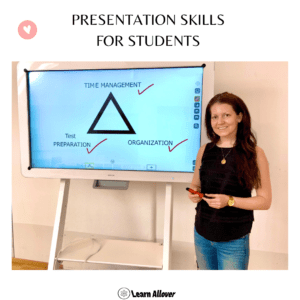
Speak What the Audience Will Understand
When giving a presentation, it’s important to consider who your audience is. If you’re presenting to classmates, you may not need to use complex words and jargon. On the other hand, if you’re speaking to a group of professionals, you’ll need to adjust your language accordingly. Speak to the level of your audience to ensure they understand your message.
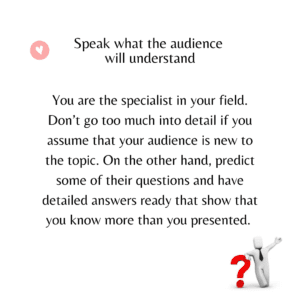
Connect With Your Audience
You don’t have to be a professional speaker to make a great presentation. Instead, make an effort to connect with your audience. Start by introducing yourself or – if your audience already knows you – tell them something that they didn‘t know about you. Additionally you might want to use humor, stories, and anecdotes to engage the audience. This can help to keep their attention and make your presentation more interesting.
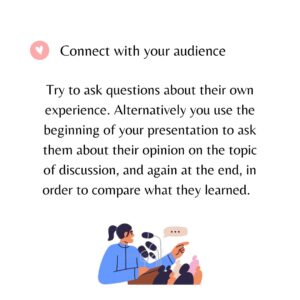
Add a Story to your Presentation
Stories are a great way to make your presentation more engaging. Consider adding a personal story or anecdote. This can help to illustrate your points and make your presentation more memorable. Additionally, stories can help to keep your classmates engaged and will spark their interest.
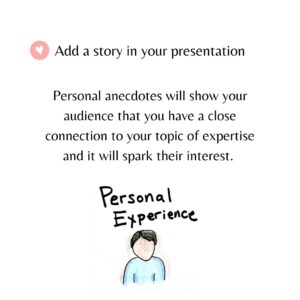
Use Visual Aids
Visual aids can be a great way to make your talk more interesting and engaging. Consider adding visuals such as graphs, photos, or videos to your presentation. This can help to break up the presentation and make it more visually appealing. Additionally, visual aids can help to illustrate your points in a way that words cannot.
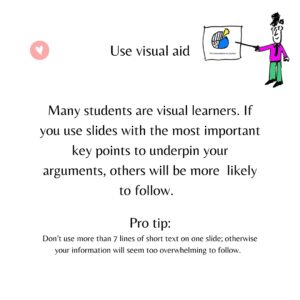
Make Eye Contact during your Presentation
Eye contact is an important part of giving a presentation. It helps to create a connection with your audience and keep them engaged. Make sure to look around the room and make eye contact with different class members. This can help to foster a more intimate connection and keep them engaged.
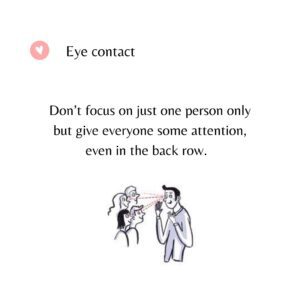
Breathe and Pause during your Presentation
When speaking in front of an audience, it’s easy to get caught up in the moment and rush through your presentation. However, it’s important to pause after key points or phrases. This gives the audience time to digest the information, and it can help to keep them engaged. Additionally, remember to take deep breaths throughout your presentation to help keep your composure.
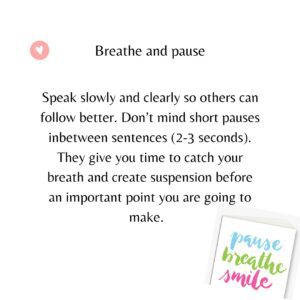
Attend Other Presentations
Another great way to make a compelling talk in class is to attend other presentations (even online!) This can help to give you a better understanding of what works and what doesn’t. Additionally, it can help you to develop your own style and become more confident in your ability to give presentations.
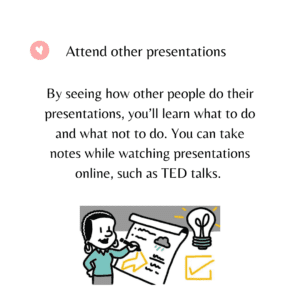
Concluding thoughts on presentation skills
Delivering interesting presentations doesn’t have to be a challenge. By following these tips, you can become an expert presenter and make an impact on your audience. So, don’t be afraid to step up to the podium and show your audience what you have to offer!
Hope that helped! If you are looking for more tips, keep reading below!
FOLLOW me on
🔴 Youtube
✍️ Read more BLOG posts!
…for more academic coaching & study tips!
P.S.:
More support for students
If you are looking for more academic support, I can offer you access to the academic coaching course for students and teachers. Check out this offer for schools if you want to find out how to apply proven learning strategies, techniques to boost motivation and valuable test preparation skills.
Support for parents: Teens’ mental health
If you are looking for support regarding your child‘s mental health and want to improve your relationship with them, I want to suggest one of my free resources: the DIY Coaching Kit
By learning more about proven coaching strategies of the parent-child dynamics and the psychology behind it, you‘ll be able to act like a life coach for your own child without them even knowing 😉
What schooling fits your family?
If you are looking for a suitable school, a student exchange program, or want to know more about alternative schooling, I might have some suggestions for you.
You want to talk to me about any topic concerning education, schooling, teens’ psychology and mental health? Feel free to email me: [email protected]

